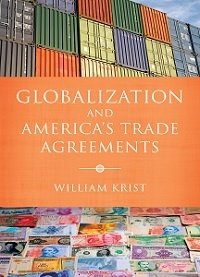Trade Policy in Crisis
What’s the reality? Have U.S. trade agreements caused unemployment in the U.S.? Have they contributed to income inequality? Have they helped or hurt our economy? How do our trade agreements impact efforts to address environmental problems? And what are the foreign policy implications of our trade agreements?

By William Krist
The U.S. has led the world’s effort to develop globally acceptable international trade rules and to reduce barriers to trade by negotiating multilateral, regional and bilateral trade agreements. This effort recently culminated in negotiation of an enormous free trade agreement, known as the Trans-Pacific Partnership, between the U.S. and 11 other Asian-Pacific countries. However, this agreement – and indeed the current trade policy regime – is now under threat. On the 2016 Presidential campaign trail, the leading candidates either oppose the TPP or advocate major changes. Parallel efforts over the past 14 years to reach a multilateral agreement in the World Trade Organization have failed. And the U.S. public has soured on trade and our trade agreements, fearful that our trade agreements have caused the loss of American jobs and threaten the environment.
What’s the reality? Have U.S. trade agreements caused unemployment in the U.S.? Have they contributed to income inequality? Have they helped or hurt our economy? How do our trade agreements impact efforts to address environmental problems? And what are the foreign policy implications of our trade agreements? These issues and more are addressed in my book Globalization and America’s Trade Agreements.
About the Book
Globalization and America’s Trade Agreements is a thorough guide to the United States’ complex trade agreements of the last 65 years, giving their historic context, theoretical framework, and impacts.
The book provides a historical account of U.S. trade agreements since 1934, including the evolution of the GATT/WTO and our regional and bilateral free trade agreements, including the recently concluded Trans-Pacific Partnership. In the book, Krist analyzes the issues in our trade agreements and discusses how economists have approached trade and how historical experience has affected theory. He assesses the effect of trade deals on the U.S. economy, the role of foreign policy such as democracy promotion in trade negotiations, how trade can affect the economies of developing countries, and how environmental concerns and labor concerns affect trade agreements.
He offers a number of specific prescriptions for the way forward for the United States and concludes with an argument that we need to move forward in improving the world trade rules, that there is no going back.
William Krist’s areas of expertise include electronics and high-tech industries, import and export policies, trade negotiations, and international trade and environmental rules. He is a former Assistant U.S. Trade Representative, and he also worked at the U.S. Congress on implementing the Tokyo Round of Trade Negotiations and at the Department of Commerce. William Krist is a Senior Policy Scholar at the Woodrow Wilson International Center for Scholars.
What Reviewers are Saying
Krist has obviously put together a scholarly work displaying a very broad understanding of the ‘whys and wherefores’ of U.S. trade agreement history.
—Ambassador Michael Smith, retired foreign service officer, former Deputy U.S. Trade Representative
I would rate this work as very important and needed. The reader is given a very good understanding of post–World War II policies and the global context in which they have functioned.
—Ambassador Alan Wolff, international trade lawyer, former Deputy U.S. Trade Representative
Krist, a former U.S. trade negotiator, provides a useful primer on current world trade rules, structures, and negotiations, from an American perspective.
—Richard N. Cooper, Foreign Affairs
The writing, level of discourse, and material are very accessible for an educated audience.
—Choice